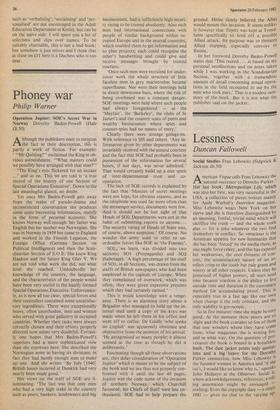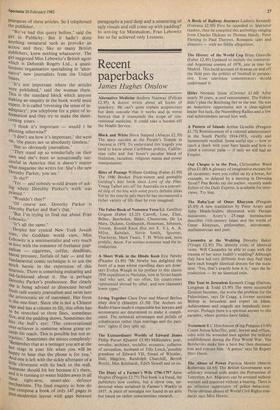Lessness
Duncan FaHowell
Social Studies Fran Lebowitz (Sidgwick Jackson £6.50)
American Vogue calls Fran Lebowitz the `natural successor to Dorothy Parker:. Her last book, Metropolitan Life, which was also her first, was very successful in the USA, a collection of pieces written mainly for Andy Warhol's Interview magazine. Miss Lebowitz wears New York on her sleeve and she is therefore distinguished by an amusing, fretful, trivial mind which will sacrifice the truth — and the whole truth alas — for a joke whenever the two find themselves in conflict. So voracious is the American appetite for new luminaries that she has been 'forced' by the media there, as one might force celery, and this has exposed her weaknesses, the cool thinness of con- tent, the unsatisfactory nature of an in- tellect crisp to the tooth but pale green and watery in all other respects. Unless they be possessed of higher powers, all stars need time because stardom is the ability to live outside time and duration is the customarY method for accumulating proof. This Is especially true in a fast age like our ow" when change is the only constant, and the only stability is gyroscopic. So in five minutes' time she might be very good. At the moment these pieces are so slight and the book contains so few of them that one wonders where they have come from, what magazines she is writing for and in what way. On the question of pro- venance the book is bound, in a breathless hush. The dust jacket prints only quotat- ions and a big heave for the Dorothy Parker connection, how Miss Lebowitz is the funniest woman in America and 'if she isn't, I would like to know who is,' squeaks John Heilpern at the Observer. Inside where acknowledgements, references, a tell- ing annotation might be envisaged -- nothing. Even the copyright date — a single 1981 — gives no clue to the varying ar.
pearances of these articles. So I telephoned the publisher.
'We've had this query before,' said the girl in Publicity. But it hadn't done anything unnatural such as provoke an action and they, like so many British publishers, knew nothing whatsoever. The girl suggested Miss Lebowitz's British agent which is Deborah Rogers Ltd., a quasi- feminist organisation specialising in 'alter- native' new journalists from the United States.
`It's not important where the articles were published,' said the woman there. This is the standard block which anyone making an enquiry in the book world must expect. it is called 'reversing the sense of in- adequacy': you telephone for a piece of in- formation and they try to make the short- coming yours.
`I think it's important — would I be Phoning otherwise?'
'I don't see how it's important,' she went °n, 'the pieces are so absolutely timeless.' 'But so obviously journalism.'
They stand up so wonderfully on their own and she's been so sensationally suc- cessful in America that it doesn't matter what magazine she writes for. She's the new Dorothy Parker, you see.' 'Is she?'
`Yes — and nobody would dream of ask- ing where Dorothy Parker's work was Printed.'
'Wouldn't they?'
'Of course not. Dorothy Parker is Dorothy Parker and that's that.'
'But I'm trying to find out about Fran Lebowitz.'
'It's all the same.'
Despite her cynical New York Jewish tone, the Goddam world view, Miss Lebowitz is a sentimentalist and very much in love with the romance of freelance jour- nalism — cigarettes, coffee, deadlines, blood pressure, fistfuls of hair — and her fundamental comic technique is to use the mock heroic in the expression of this neurosis. There is something endearing and old-fashioned about it. She is perhaps Dorothy Parker's predecessor. But clearly she is being advised to dissociate herself from café society journalism and swim into Inc aristocratic air of statement. Her form is the one-liner. Since she is not a Chinese sage and has a column to fill, this often has 10 be stretched to three lines, sometimes five, and the padding shows. Sometimes she nits the bull's eye: 'The conversational over-achiever is someone whose grasp ex- ceeds his reach. This is possible but not at- tractive.' Sometimes she misses completely: `Remember that as a teenager you are at the last stage in your life when you will be haPpy to hear that the phone is for you.' And one is left with the sickly aftertaste of a little cleverness with its back to the wall. Someone should hit her because it's there, and it is running to waste hidden away in all these tight-arse, smart-alec defence mechanisms. The final enquiry is: how do You compose a book of only 147 pages in 13°51-modernist layout with gaps between
paragraphs a yard deep and a smattering of ugly visuals and still come up with padding? In striving for Minimalism, Fran Lebowitz has so far achieved only Lessness.







































 Previous page
Previous page